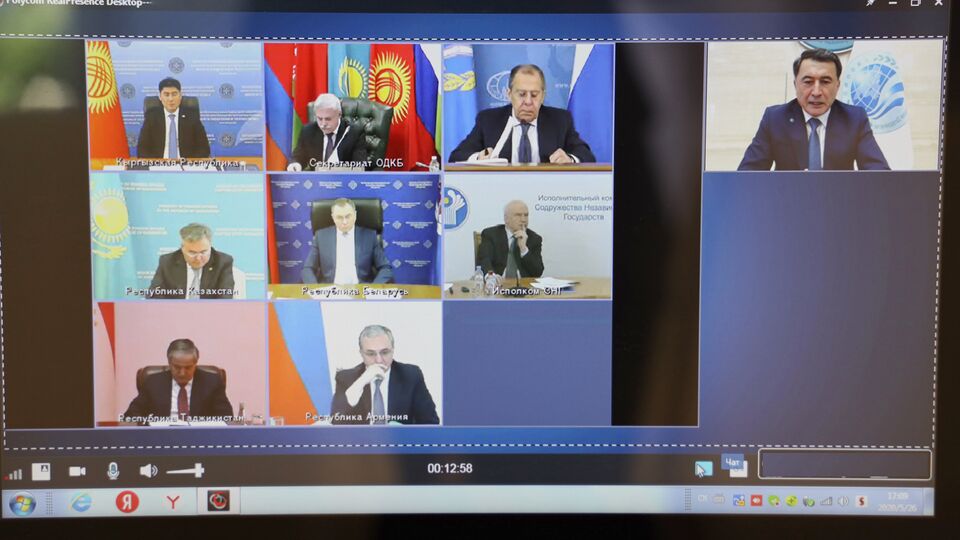On 26 May 2020, SCO Secretary-General Vladimir Norov attended a meeting (via videoconference) of the Council of Foreign Ministers of the Collective Security Treaty Organisation member states.
During the meeting, the parties exchanged opinions on current international and regional developments and the influence of the international and regional situation on the security of the CSTO member states, as well as cooperation prospects between the CSTO, the SCO and the CIS.
Vladimir Norov noted that the SCO perceived the CSTO and the CIS as priority partners. The SCO has signed memorandums with these associations that reflect the common and mutually complementary goals and tasks of these organisations.
In this context, he noted the importance of holding annual meetings of the top administrators, executives and officials in an SCO-CSTO-CIS format and their joint participation in the international UN Security Council meeting (25 September 2019) on the role of regional associations in combating terrorist threats.
Mr Norov said the changes in today's challenges and threats made it necessary to promote and improve key aspects of multilateral cooperation.
According to the SCO Secretary-General, the borders between physical space and virtual reality are being eroded in the modern world. "The more active use of G5 networks in telecommunications, linked with new technologies, such as artificial intelligence, big data volumes, cloud storage and the Internet of Things, have created new information threats that impact the safety of people, society and the state. At the same time, the forced digitalisation of state governance, business operations and private life during the pandemic has increased crime rates in the area of information and communications technologies," Mr Norov noted. In this context, he suggested initiating cooperation between the SCO, the CSTO and the CIS in the area of maintaining information security.
Mr Norov noted that the partner organisations were focusing on the situation in neighbouring Afghanistan. He called for closely coordinating the joint efforts of the SCO-Afghanistan Contact Group and the Working Group on Afghanistan at the Council of CSTO Foreign Ministers. This will help thwart attacks by international terrorist organisations, primarily ISIS, against SCO, CSTO and SCO member states.
The SCO Secretary-General said the coronavirus pandemic had aggravated social tensions and radical moods in society. The pandemic also makes the threat of bio-terrorism more relevant. In this connection, he noted the importance of subsequent joint efforts by the SCO's Regional Anti-Terrorist Structure (RATS) and the specialised counter-terrorist agencies of the CSTO and the CIS to destroy the recruiting-propaganda chain of terrorist organisations, to deprive terrorists of their financial and logistics support channels and to quickly expose the relevant threats online.
Mr Norov noted that matters linked with efforts to implement practical measures and exchange practical counter-terrorism experience, including within the framework of the SCO Peace Mission's headquarters and counter-terrorist exercise, should remain a high-priority in multilateral cooperation as part of the counter-terrorist agenda.
According to the SCO Secretary-General, special attention should be devoted to collective anti-drug efforts in connection with the potential transformation of the global drug market, now that state borders have been closed. In this context, he noted the importance of Operation Spider Web, conducted by the law enforcement agencies of SCO member states on 23-27 March 2020 in order to eliminate current drug supply channels, including by using online resources and virtual payment plans.
Mr Norov said it was important to maintain cooperation between the SCO and the Coordination Council of Heads of Law Enforcement Agencies and the Coordination Meeting of Chief CSTO Narcologists for studying advanced experience and know-how.
In conclusion, the SCO Secretary-General underscored the need for the full implementation of SCO-CSTO-CIS memorandums of cooperation, including by exchanging open information-analytical materials and organising joint events on the range of regional security matters. This could also be accomplished through specialised UN Family agencies in the process.
